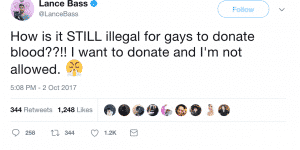Congressmembers Defeat Anti-LGBTQ Discrimination Adoption Bill
Guest post by Maxine Chalker
On Wednesday, September 26, 2018, the US House of Representatives overwhelmingly passed a new appropriations bill funding the Departments of Health and Human Services, Labor, Education and Defense. The “Aderholt Amendment” was nowhere to be found.
Introduced by Alabama Republican Robert Aderholt, the amendment would have forced the federal government to fund adoption and foster care agencies that refuse their services to LGBTQ couples and individuals. The amendment was secretly ferreted into the bill by a House appropriations committee in July, despite widespread protest from adoption and LGBTQ advocates.
As written, the Aderholt Amendment would have provided strong incentive for state and local governments to allow discriminatory practices in the adoption space. It would have penalized governments who maintain anti-discrimination policies for adoption and foster care agencies, by withholding federal health and human services funding.
At least 44 states currently impose anti-discrimination measures on foster care and adoption agencies, the Washington Blade reports. If approved, the Aderholt Amendment could have triggered dramatic cuts in foster care and adoption subsidies to these states. Aderholt’s provision stipulated a 15% cut in child welfare funding for any state that barred adoption and foster care agencies from discriminating against LGBTQ couples and singles through the adoption process. Taken together, the states could have lost over $1 billion in federal funding for foster care and adoption agencies.
Adherholt’s amendment was widely derided as a “license to discriminate” by many in the LGBTQ community. In the House, it received strong opposition from State Representative Rosa DeLauro, a Democrat representing Connecticut voters. Washington’s Democratic Senator Patty Murray led the charge against the amendment in the Senate.
Spearheaded by Murray and Senator Ron Wyden (D-Oregon), a group of 40 Senate Democrats called for the amendment’s rejection in July, submitting a strongly-worded letter against Aderholt’s proposal to the Senate Appropriations Committee. “The inclusion of such legislation,” the Senators wrote, “would sanction taxpayer-funded discrimination and prevent a significant share of Americans from opening their homes to foster children.”
Thanks to this strong opposition, the House refused to adopt Aderholt’s language, passing its own version of the funding legislation that was free of the discriminatory amendment. A committee convened to reconcile the House and Senate versions of the appropriations bill also dropped the language, effectively sounding the death knell of Aderholt’s Amendment.
After the amendment’s defeat, Representative DeLauro voiced her satisfaction, saying, “children deserve to live in safe, happy and healthy permanent homes, and their best interests should always be placed first. No qualified adoptive and foster care parent should be discriminated against, period.”
At any given time, there are nearly 438,000 children in foster care in the United States, Children’s Rights reports. Many children languish in the system for years. A substantial minority, around 5%, age out of the foster care system every year, having failed to have been matched with permanent families.
This problem cannot be solved exclusively by LGBTQ families, but it’s worth noting that queer singles and couples are far more likely to adopt children than straight parents. LGBTQ parents are about four-times more likely to be raising an adopted child or multiple adopted children than straight parents.
Congress’ rejection of the Aderholt Amendment is a strong vote in opposition to adoption discrimination at the federal level, but there is much work left to do. Aderholt’s Amendment was modeled after similar initiatives that have taken hold in state congresses around the country.
At least 10 states have passed their own versions of a “license to discriminate,” allowing adoption and foster care agencies to refuse their services to LGBTQ adopters on the basis of firmly-held religious beliefs. In my next post, we’ll take a closer look at these laws to see how state legislatures are actively working against the LGBTQ community.
About Maxine Chalker:
Maxine Chalker, MSW / LSW is founder and executive director of Adoptions From The Heart, one of the East Coast’s largest private adoption agencies. A proud supporter of the LGBT community, she has devoted her career to promoting open adoption.






















